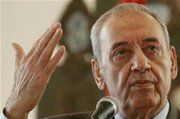 BEIRUT Daily Star: Speaker Nabih Berri declared Thursday that no Parliament session can take place without him, and warned that while the Lebanese Army would remain united during a widely feared domestic political crisis, the Internal Security Forces (ISF) might split. Appearing on the country’s most influential political talk show, the Lebanese Broadcasting Corporation’s "Kalam al-Naas," Berri warned that despite what some in the March 14 camp might think, Parliament cannot convene to elect a new president without him.
BEIRUT Daily Star: Speaker Nabih Berri declared Thursday that no Parliament session can take place without him, and warned that while the Lebanese Army would remain united during a widely feared domestic political crisis, the Internal Security Forces (ISF) might split. Appearing on the country’s most influential political talk show, the Lebanese Broadcasting Corporation’s "Kalam al-Naas," Berri warned that despite what some in the March 14 camp might think, Parliament cannot convene to elect a new president without him.
"Because I called for a parliamentary session on September 25, they cannot meet … without me or by virtue of law as they think," said Berri, quoting Article 73 of the Constitution. The speaker vowed to continue calling for a session, even after October 24, which marks a deadline of 10 days before President Emile Lahoud’s (extended) mandate expires and said: "I have the right!" "There are hundreds of legitimate [candidates] among the Maronites, so why can’t we agree on one?" he asked.
Berri also expressed disappointed at the "delays" from the majority camp in responding to his initiative. "By delaying, the intensity of the initiative dies down," said Berri, who nonetheless insisted that he would push his compromise proposal to the very end. Citing a poll of 600 Beirutis from all sects conducted on Thursday, Berri said 76 per cent backed his initiative, with support strongest among Shiites (99 per cent) and lowest among Druze (55 per cent).
Berri also expressed "discomfort" at a statement by UN Middle East envoy Terje Roed-Larsen, who opined that if the two thirds-quorum is not present, a president should be elected by absolute majority and should fulfill all UN resolutions, particularly 1559. "The Lebanese are in great disagreement over 1559, so why raise that controversial point at this crucial time?" asked Berri, who added that he received a telephone call from UN Secretary Ban Ki-moon, who assured him that what Roed-Larsen said will be "discussed and studied."
Berri also feared security crisis in the last critical days, predicting that the ISF "might divide as the army stays united and away at their bases."
He also warned that "if Christians leave Lebanon, Lebanon’s existence is threatened."
The ruling March 14 Forces met late on Wednesday at the residence of former President Amin Gemayel in Bikfaya and said they were "open" to Berri’s initiative and extended their invitation to the March 8 camp, but demanded "an unconditional dialogue."
"Let us head to dialogue without weapons, excuses and intimidation … Let’s not say we want an election with a half-plus-one vote and let them [the opposition] not block elections under the pretext of a two-thirds quorum," said the statement as read by parliamentary majority leader MP Saad Hariri.
Two weeks ago, Berri announced that the opposition was ready to drop its demand for a national unity government if all factions could agree on a candidate for the presidency.
March 14 said it wanted to meet and discuss the consensus candidate, but made no reference to Berri’s calling for a two-thirds quorum of MPs to be present on September 25.
"The March 14 Forces urge the opposition … to spare the country the dilemma of recip-rocal conditions which hampers the dialogue and cause a presidential vacuum," the statement said.
"Let’s all dedicate ourselves to rescuing the presidential election from the unknown," the document added.
The statement said March 14 considers the upcoming presidential election a "fundamental point" in restoring political stability and implementing decisions previously adopted by all-party national talks as well as United Nations Security Council resolutions.
"March 14 welcomes the principles of dialogue and agreement and stresses that dialogue is the Lebanese’s only salvation and [the only way] to rebuild trust in their nation, state and institutions," it said.
At the same time, the head of the opposition Free Patriotic Movement, MP Michel Aoun, called the response "an escalatory rejection."
In an interview with the Pan Arab daily Al-Hayat, Aoun said he endorses a transition government headed by the head of the army, General Michel Suleiman, but if the Constitution is "overthrown," then the "strongest group should rule."
While Hizbullah and Amal have not officially announced who they support as a candidate, Aoun confirmed that they support him as presidential candidate, and when asked if the opposition would support someone else during the consensus discussions, Aoun said: "Let us see if they [the opposition] would accept another choice."
Presidential candidate MP Robert Ghanem stressed on Thursday that he will not accept becoming a transitional president, but rather he wants to "a president for six years."
"I want to be a president for all of Lebanon, from January 1 to December 31, for all sects, parties and opinions, for six years without any extension or renewal [of mandate]," the legislator said in a statement.
Ghanem also declared that the presidency is not the property of either "March 14 or March 8" but that it belongs to all of Lebanon.



